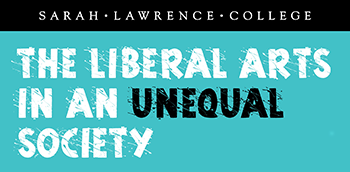Event Title
Concluding Reflections: The Liberal Arts in an Unequal Society
Location
Donnelley Theatre, Heimbold Visual Arts Center
Start Date
15-11-2014 4:30 PM
End Date
15-11-2014 5:30 PM
Abstract
The United States has entered a new gilded age, with dizzying inequalities in wealth and income accompanied by a steep decline in social mobility. This vast increase in inequality has inescapable implications for the content as well as the value of a liberal arts education and for the social roles that colleges committed to the liberal arts should embrace. In these remarks I seek to offer an integrating framework for bringing together important recent research surround the extent nature of 21st Century socio-economic inequality and the contemporary debate about the value of the liberal arts in a late modern society. With regards to inequality, I offer a framework of analysis that focuses less exclusively on inequality at the top (cf. Piketty, et. al.), and more generally on the overall steepness of the gradient of inequality sepating major segments (e.g. quintiles) of society. From this perspective increased inequality of income and wealth results not only in overall maldistribution of resources but also in greater social distance between strata and consequent heightening of competition and status anxiety. In such a society the competition for comparative and positional goods, goods that appear to not only mark but also to stabilize relative standing, will predictably grow increasingly important and intense. With regards to the liberal arts, I suggest an analytic framework that, rather than choosing between, seeks to combine sociological realism about the contribution of liberal education to the reproduction of relative standing, privilege and hierarchical social order with a humanistic perspective on the intrinsic value of liberal education for the individual and society. Bringing these frameworks together, I suggest that, in an increasingly unequal society, the intrinsic goods realized within a liberal arts education become either increasingly difficult to secure or obtainable only by an increasingly narrow and privileged class of students, while at the same time the negative values associated with liberal education (e.g. its capacity to serve as a legitimating vehicle for the intergenerational transmission on unequal cultural capital) grow increasingly prominent. I conclude by surveying some suggestions for how liberal arts colleges might best counteract these troubling trends both internally and through engagement with the communities in which they operate.
Presenter Biography
David Peritz is a member of the Politics faculty at Sarah Lawrence College. He holds a BA from Occidental College and earned a Dphil from Oxford University. His special interests are in democracy in conditions of cultural diversity, social complexity and political dispersal, critical social theory, social contract theory, radical democratic thought, and the idea of dispersed but integrated public spheres that create the social and institutional space for broad-based, direct participation in democratic deliberation and decision-making. He is a recipient of a Marshall scholarship. He has taught at Harvard University, Deep Springs College, and Dartmouth College and has been a visiting scholar at Erasmus University in Rotterdam, and the London School of Economics.
Streaming Media
Concluding Reflections: The Liberal Arts in an Unequal Society
Donnelley Theatre, Heimbold Visual Arts Center
The United States has entered a new gilded age, with dizzying inequalities in wealth and income accompanied by a steep decline in social mobility. This vast increase in inequality has inescapable implications for the content as well as the value of a liberal arts education and for the social roles that colleges committed to the liberal arts should embrace. In these remarks I seek to offer an integrating framework for bringing together important recent research surround the extent nature of 21st Century socio-economic inequality and the contemporary debate about the value of the liberal arts in a late modern society. With regards to inequality, I offer a framework of analysis that focuses less exclusively on inequality at the top (cf. Piketty, et. al.), and more generally on the overall steepness of the gradient of inequality sepating major segments (e.g. quintiles) of society. From this perspective increased inequality of income and wealth results not only in overall maldistribution of resources but also in greater social distance between strata and consequent heightening of competition and status anxiety. In such a society the competition for comparative and positional goods, goods that appear to not only mark but also to stabilize relative standing, will predictably grow increasingly important and intense. With regards to the liberal arts, I suggest an analytic framework that, rather than choosing between, seeks to combine sociological realism about the contribution of liberal education to the reproduction of relative standing, privilege and hierarchical social order with a humanistic perspective on the intrinsic value of liberal education for the individual and society. Bringing these frameworks together, I suggest that, in an increasingly unequal society, the intrinsic goods realized within a liberal arts education become either increasingly difficult to secure or obtainable only by an increasingly narrow and privileged class of students, while at the same time the negative values associated with liberal education (e.g. its capacity to serve as a legitimating vehicle for the intergenerational transmission on unequal cultural capital) grow increasingly prominent. I conclude by surveying some suggestions for how liberal arts colleges might best counteract these troubling trends both internally and through engagement with the communities in which they operate.


